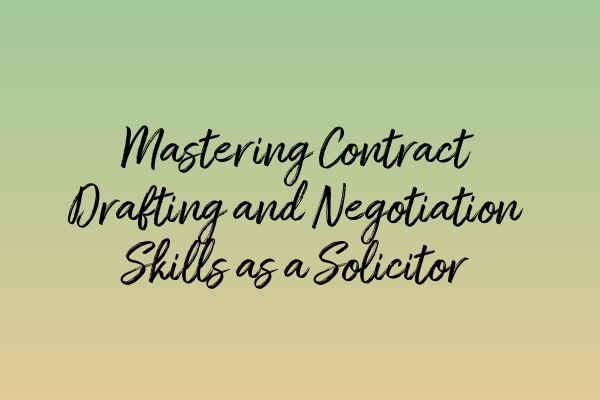Mastering Contract Drafting and Negotiation Skills as a Solicitor
Welcome to another informative article from Become Solicitor SRA! In this post, we will explore the essential skills and techniques required to master contract drafting and negotiation as a solicitor. Contract drafting and negotiation are crucial aspects of legal practice, and being proficient in these areas is vital for solicitors across various fields.
So, let’s dive right in and explore some key tips and strategies to help you become an expert in contract drafting and negotiation.
1. Understand the Purpose of the Contract
Before you start drafting a contract, it is crucial to understand its purpose. What are the objectives of the parties involved? What outcomes are they seeking to achieve? By having a clear understanding of the contract’s purpose, you can tailor the drafting and negotiation process accordingly.
Related Article: A Closer Look at the Bar Professional Training Course (BPTC)
2. Conduct Thorough Research
Once you understand the purpose of the contract, conducting thorough research is essential. Understand the laws and regulations relevant to the contract’s subject matter. Familiarize yourself with any industry-specific terms and standards that may impact the drafting and negotiation process.
Related Article: The Role of Technology in Modern Legal Practice
3. Clearly Define the Terms and Conditions
The key to effective contract drafting is clarity. Clearly define all terms and conditions, using precise language that leaves no room for ambiguity. Anticipate any potential areas of dispute and address them proactively in the contract. This will help avoid future conflicts and disagreements.
4. Pay Attention to Detail
When it comes to contract drafting, attention to detail is paramount. Review the contract meticulously, ensuring there are no errors, inconsistencies, or omissions. Any mistakes in the contract’s wording or structure can have significant legal implications. Take the time to go through each clause and ensure it accurately reflects the parties’ intentions.
5. Consider Alternative Dispute Resolution Mechanisms
During contract negotiation, it is essential to consider alternative dispute resolution mechanisms. Mediation or arbitration can offer parties a more cost-effective and time-efficient approach to resolving disputes, as opposed to traditional litigation. Including provisions for alternative dispute resolution can be beneficial for all parties involved.
6. Maintain Effective Communication
Active and effective communication is key during the contract negotiation process. Clearly articulate your client’s position, while also listening and understanding the other party’s concerns. Building rapport and finding common ground can pave the way for successful negotiations.
Related Article: A Look into Prominent Law Firms in the UK
7. Stay Up-to-Date with Legal Developments
As a solicitor, it is crucial to stay informed about any legal developments that may impact contract drafting and negotiation. Changes in legislation or case law can significantly impact the enforceability and interpretation of contract clauses. Stay updated by reading legal journals, attending seminars, and engaging in continuous professional development.
8. Seek Feedback and Learn from Experience
Contract drafting and negotiation skills are honed through practice and experience. Seek feedback from senior solicitors or mentors, and learn from each negotiation process. Reflect on your strengths and areas for improvement, adapting your approach to align with the specific needs of each case.
Conclusion
Mastering contract drafting and negotiation skills is a journey that requires constant dedication and improvement. By understanding the purpose of the contract, conducting thorough research, maintaining clarity, and staying up-to-date with legal developments, you can become a proficient solicitor in this aspect of legal practice.
Related Articles:


Leave a Reply